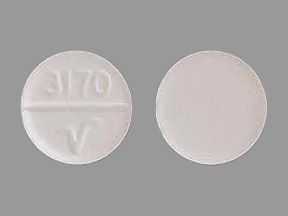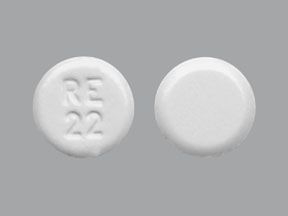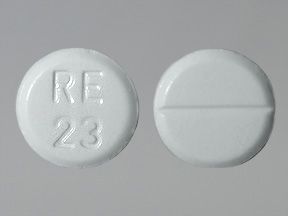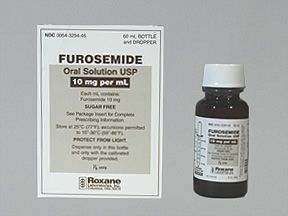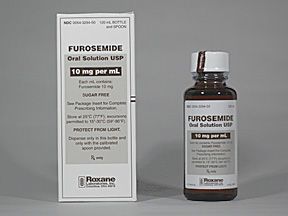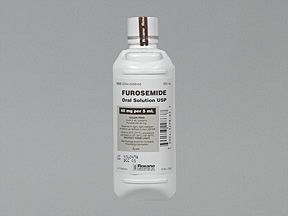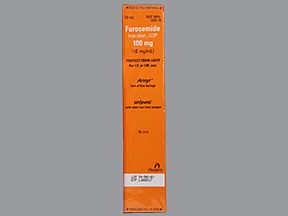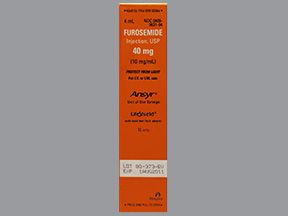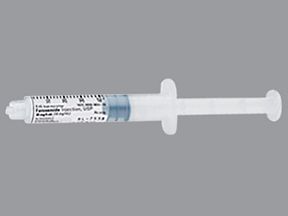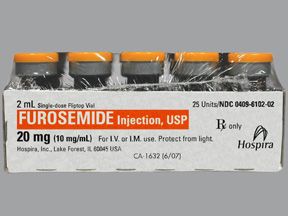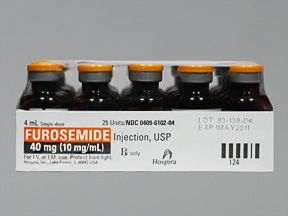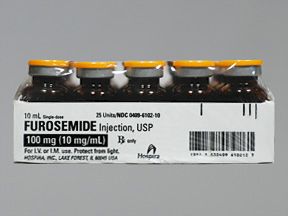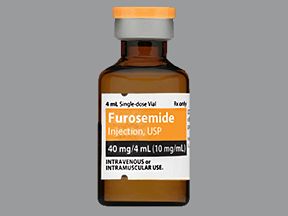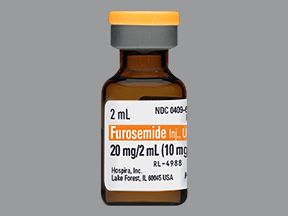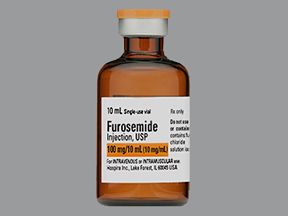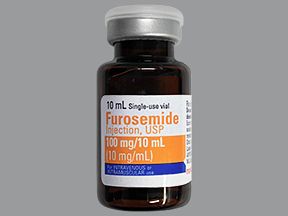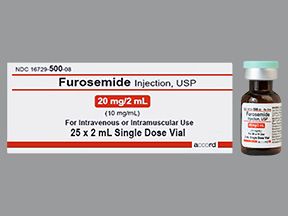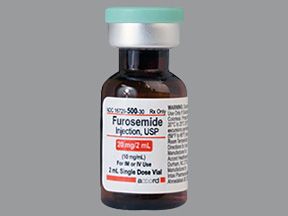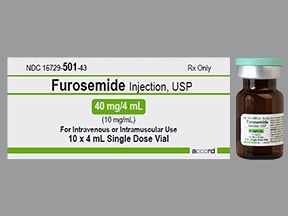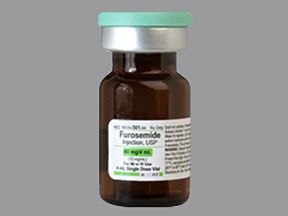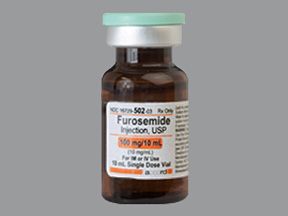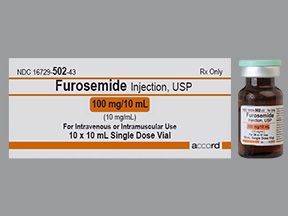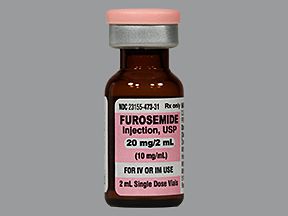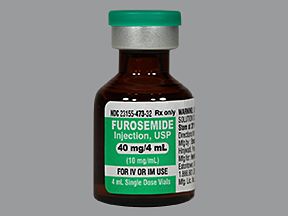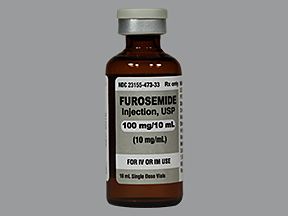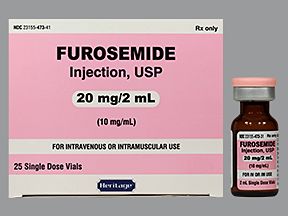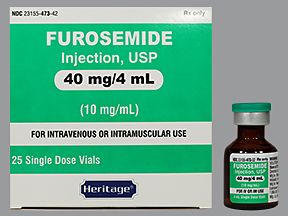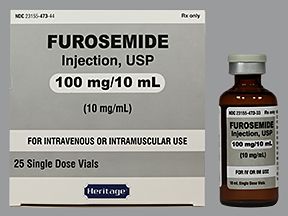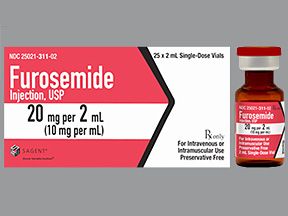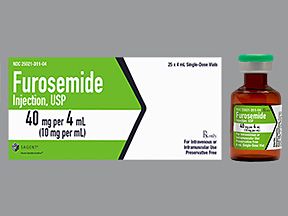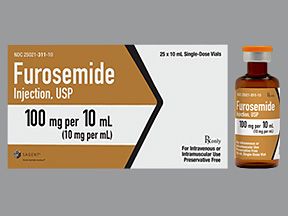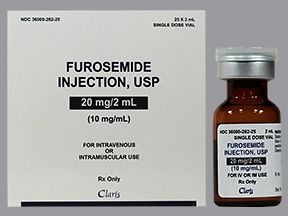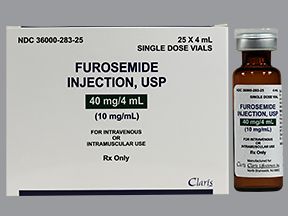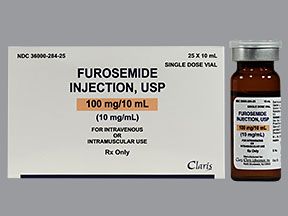- Furosemide oral tablet is available as both a generic and a brand-name drug. Brand name: Lasix.
- Furosemide also comes in an oral solution that you take by mouth and an injectable solution that is given by a healthcare professional.
- It is used to treat high blood pressure in adults. It’s also used to treat edema in adults and some children, which is swelling caused by fluid buildup in your body.
FDA warning: Dehydration risk
- This drug has a boxed warning. This is the most serious warning from the Food and Drug Administration (FDA). A boxed warning alerts doctors and patients to drug effects that may be dangerous.
- Furosemide is a strong diuretic (water pill) that helps your body get rid of excess water. It does this by increasing the amount of urine your body makes. If you take too much of this drug, it can lead to very low amounts of water and electrolytes in your body. This can cause dehydration. Your doctor will monitor your fluid levels and may change your dosage based on those levels.
- Low blood pressure warning: This drug can cause low blood pressure. Symptoms include feeling dizzy and faint after standing up. If this occurs, move slowly when changing positions after sitting or lying down. If this problem continues, call your doctor.
- Low potassium levels warning: This drug can cause low potassium levels. (Potassium is a mineral that helps your nerves, muscles, and organs work normally.) Symptoms include tiredness, muscle weakness, and nausea or vomiting. Call your doctor if you have these symptoms.
- Low thyroid levels warning: High doses (over 80 mg) of furosemide can cause low levels of thyroid hormones. If you’re taking high doses of this drug and have symptoms of thyroid problems, call your doctor. These symptoms can include:
- tiredness
- weakness
- weight gain
- dry hair and skin
- increased feelings of being cold
Furosemide oral tablet is a prescription drug that’s available as the brand-name drug Lasix. It’s also available as a generic drug. Generic drugs usually cost less. In some cases, they may not be available in every strength or form as the brand-name version.
Why it’s used
Furosemide is used to treat hypertension (high blood pressure). It is also used to treat edema. This is swelling due to fluid buildup in the body. Edema can be caused by other medical conditions such as heart failure, cirrhosis of the liver, or kidney disease.
Furosemide may be used as part of combination therapy to treat high blood pressure. This means you may need to take it with other medications.
How it works
Furosemide belongs to a class of drugs called diuretics. A class of drugs is a group of medications that work in a similar way. These drugs are often used to treat similar conditions.
Furosemide works by helping your body get rid of excess salt and water. It does this by increasing the amount of urine your body makes. This helps lower your blood pressure as well as reduce swelling.
Furosemide oral tablets may cause certain side effects.
More common side effects
The more common side effects that can occur with furosemide include:
- nausea or vomiting
- diarrhea
- constipation
- stomach cramping
- feeling like you or the room is spinning (vertigo)
- dizziness
- headache
- blurred vision
- itching or rash
- increased urination
If these effects are mild, they may go away within a few days or a couple of weeks. If they’re more severe or don’t go away, talk with your doctor or pharmacist.
Serious side effects
Call your doctor right away if you have serious side effects. Call 911 if your symptoms feel life threatening or if you think you’re having a medical emergency. Serious side effects and their symptoms can include the following:
- Excessive loss of water and electrolytes. Symptoms can include:
- dry mouth
- feeling of thirst
- weakness
- drowsiness
- restlessness
- muscle pains or cramps
- urinating less
- fast or abnormal heartbeat
- severe nausea or vomiting
- Low levels of thyroid hormones. Symptoms can include:
- tiredness
- weakness
- weight gain
- dry hair and skin
- increased feelings of being cold
- Pancreatitis (inflammation of the pancreas). Symptoms can include:
- pain when you eat or drink
- severe nausea or vomiting
- fever
- Liver damage. Symptoms can include:
- yellowing of your skin
- yellowing of the whites of your eyes
- Hearing loss or ringing in your ears (can be temporary or permanent)
- Blistering or peeling skin
- Orthostatic hypotension (low blood pressure that happens when you stand up)
- Allergic reaction
Disclaimer: Our goal is to provide you with the most relevant and current information. However, because drugs affect each person differently, we cannot guarantee that this information includes all possible side effects. This information is not a substitute for medical advice. Always discuss possible side effects with a healthcare professional who knows your medical history.
Furosemide oral tablet can interact with other medications, vitamins, or herbs you may be taking. An interaction is when a substance changes the way a drug works. This can be harmful or prevent the drug from working well.
To help avoid interactions, your doctor should manage all of your medications carefully. Be sure to tell your doctor about all medications, vitamins, or herbs you’re taking. To find out how this drug might interact with something else you’re taking, talk with your doctor or pharmacist.
Examples of drugs that can cause interactions with furosemide are listed below.
Antibiotics
Antibiotics can increase your risk of hearing damage or loss when taken with furosemide. These drugs include:
- amikacin
- gentamicin
- neomycin
- paromomycin
- tobramycin
Antiseizure drug
Taking this drug with furosemide can decrease the effects of furosemide:
- phenytoin
Cancer drug
Taking this cancer drug with furosemide can increase your risk of kidney problems and hearing damage or loss:
- cisplatin
Taking this cancer drug with furosemide can decrease the effects of furosemide. Also, furosemide may increase the amount of this drug in your body, which can increase side effects:
Immunosuppressant
Taking this drug with furosemide can increase your risk of gouty arthritis:
Mood stabilizers (lithium)
Taking lithium with furosemide can increase the levels of lithium in your body. This raises your risk of side effects from lithium.
Muscle relaxers
Taking certain muscle relaxers with furosemide can increase the effects of these drugs. This raises your risk of side effects. These drugs include:
- succinylcholine
Other blood pressure drugs
Taking furosemide with other blood pressure drugs can cause your blood pressure to drop to a dangerously low level. These drugs include:
- benazepril
- captopril
- enalapril
- fosinopril
- lisinopril
- moexipril
- perindopril
- quinapril
- ramipril
- trandolapril
Pain and inflammation drugs (NSAIDs)
Taking NSAIDs (nonsteroidal anti-inflammatory drugs) with furosemide can increase the levels of these drugs in your body. This raises your risk of dangerous side effects. NSAIDs include:
Thyroid drugs
Taking high doses of furosemide with levothyroxine can make levothyroxine less effective. This means it won’t work as well to treat your thyroid condition.
Ulcer drugs
Taking sucralfate with furosemide can make furosemide less effective. This means it won’t work as well to control your symptoms.
Don’t take sucralfate within 2 hours of taking furosemide.
Water pills (diuretics)
Taking other diuretics with furosemide can increase your risk of hearing damage or loss. These drugs include:
- ethacrynic acid
Disclaimer: Our goal is to provide you with the most relevant and current information. However, because drugs interact differently in each person, we cannot guarantee that this information includes all possible interactions. This information is not a substitute for medical advice. Always speak with your healthcare professional about possible interactions with all prescription drugs, vitamins, herbs and supplements, and over-the-counter drugs that you are taking.
Furosemide oral tablet comes with several warnings.
Allergy warning
If you have an allergy to sulfonamides (sulfa drugs), you may also be allergic to furosemide. Taking this drug can cause a severe allergic reaction, causing symptoms such as:
- trouble breathing or swallowing
- swelling of your throat or tongue
- hives
If you have these symptoms, call 911 or go to the nearest emergency room right away.
Don’t take this drug again if you have ever had an allergic reaction to it or sulfonamides before. Taking it a second time after any allergic reaction to it could be fatal (cause death).
Alcohol interaction
Having drinks that contain alcohol while taking furosemide can make the drug’s side effects worse. For instance, it can worsen a sudden drop in blood pressure when you stand up after sitting or lying down. It can also make you feel dizzier or more lightheaded.
Warnings for people with certain health conditions
For people living with kidney problems: Furosemide is removed from your body by your kidneys. If you have kidney problems, more of the drug may stay in your body longer. This could lead to dangerous side effects, including very low blood pressure. Your doctor may start you on a lower dose of this drug. Your doctor may also monitor how well your kidneys are working to make sure furosemide is safe for you to take.
For people living with liver problems: If you have liver problems such as cirrhosis or ascites, it’s best to receive furosemide in the hospital. Furosemide can cause very low electrolyte levels, which can cause serious liver damage and loss of brain function. (Electrolytes are minerals that help control the fluid balance in your body and help with other important functions.) Your doctor will monitor you closely.
For people living with diabetes: Furosemide can make it harder to control your blood sugar (glucose) levels. Before taking this drug, be sure your doctor knows you have diabetes.
For people living with bladder disorders: If you have severe problems with emptying your bladder completely, furosemide can make your condition worse. Before taking this drug, be sure your doctor knows you have a bladder disorder.
For people living with thyroid problems: High doses (over 80 mg) of furosemide can cause low levels of thyroid hormones. Be sure to tell your doctor about your thyroid problems before you start taking furosemide.
Warnings for other groups
For pregnant people: Talk with your doctor if you’re pregnant or planning to become pregnant. Research in animals has shown adverse effects on the fetus when the mother takes the drug. There haven’t been enough studies done on humans to be certain how the drug might affect the fetus. This drug should only be used if the potential benefit justifies the potential risk to the fetus.
For people who are nursing: Furosemide may pass into breast milk and can cause serious side effects in a child who is breastfed. It may also cause your body to produce less milk. Tell your doctor if you are nursing. You will need to decide either to stop nursing or stop taking this drug.
For children: In premature infants and children younger than 4 years of age, furosemide may cause kidney problems. It can lead to kidney stones and calcium deposits in the kidneys. If furosemide is given to premature infants during the first few weeks of life, it may increase the risk of problems with the lungs and heart.
This dosage information is for furosemide oral tablet. All possible dosages and drug forms may not be included here. Your dose, drug form, and how often you take the drug will depend on:
- your age
- the condition being treated
- how severe your condition is
- other medical conditions you have
- how you react to the first dose
Forms and strengths
Generic: furosemide
- Form: Oral tablet
- Strengths: 20 mg, 40 mg, and 80 mg
- Form: Oral solution
- Strengths: 10 mg per 1 mL, 40 mg per 5 mL
Brand: Lasix
- Form: Oral tablet
- Strengths: 20 mg, 40 mg, and 80 mg
Dosage for hypertension (high blood pressure)
Adult dosage (ages 18–64 years)
- The usual starting dose is 80 mg per day, taken as 40 mg twice each day.
- Your doctor may change your dose or add other blood pressure medications. This depends on how your body responds to the drug.
Child dosage (ages 0–17 years)
This drug has not been studied in children for treating high blood pressure.
Senior dosage (ages 65 years and older)
The kidneys of older adults may not work as well as they used to. This can cause your body to process drugs more slowly. As a result, more of a drug stays in your body for a longer time. This increases your risk of side effects. Your doctor may start you on a lowered dose or a different medication schedule. This can help keep levels of this drug from building up too much in your body.
Special considerations
Furosemide is removed from your body by your kidneys. If you have kidney problems, more of the drug may stay in your body longer. This can cause dangerous side effects. Your doctor may start you on a lower dose and monitor how well your kidneys are working to make sure this drug is safe for you.
Dosage for edema
Adult dosage (ages 18–64 years)
- The usual starting dose is 20–80 mg, taken once per day. Your doctor may change your dose depending on how your body responds to the drug.
- Once your doctor determines your long-term (maintenance) dose, you may take it once or twice per day.
Child dosage (ages 0–17 years)
- The usual dose is 2 mg per kg of body weight taken once per day.
- It is not recommended to use doses greater than 6 mg per kg of body weight.
- Your doctor may change your child’s dosage depending on how your child’s body responds to the drug.
Senior dosage (ages 65 years and older)
The kidneys of older adults may not work as well as they used to. This can cause your body to process drugs more slowly. As a result, more of a drug stays in your body for a longer time. This increases your risk of side effects. Your doctor may start you on a lowered dose or a different medication schedule. This can help keep levels of this drug from building up too much in your body.
Special considerations
Furosemide is removed from your body by your kidneys. If you have kidney problems, more of the drug may stay in your body longer. This can cause dangerous side effects. Your doctor may start you on a lower dose and monitor how well your kidneys are working to make sure this drug is safe for you.
Disclaimer: Our goal is to provide you with the most relevant and current information. However, because drugs affect each person differently, we cannot guarantee that this list includes all possible dosages. This information is not a substitute for medical advice. Always speak with your doctor or pharmacist about dosages that are right for you.
Furosemide oral tablet is used for short-term or long-term treatment. It comes with serious risks if you don’t take it as prescribed.
If you stop taking the drug suddenly or don’t take it at all: If you are treating high blood pressure, your blood pressure may rise. This raises your risk of serious problems such as stroke or heart attack.
If you are treating edema, your swelling could get worse. This increases your risk of serious problems such as pain, infections, leg ulcers (long lasting sores), and blood clots.
If you miss doses or don’t take the drug on schedule: Your medication may not work as well or may stop working completely. For this drug to work well, a certain amount needs to be in your body at all times.
If you take too much: You could have dangerous levels of the drug in your body. Symptoms of an overdose of this drug can include:
- extreme tiredness
- dizziness
- thirst
- low blood pressure
If you think you’ve taken too much of this drug, call your doctor or local poison control center. If your symptoms are severe, call 911 or go to the nearest emergency room right away.
What to do if you miss a dose: Take your dose as soon as you remember. But if you remember just a few hours before your next scheduled dose, take only one dose. Never try to catch up by taking two doses at once. This could result in dangerous side effects.
How to tell if the drug is working: If you’re treating high blood pressure, your blood pressure should be lowered. But you will likely not feel any different. Your doctor will monitor your blood pressure. You can also check it at home using a home blood pressure monitor. If you’re treating edema, your swelling should go down.
Keep these considerations in mind if your doctor prescribes furosemide oral tablet for you.
General
- Furosemide causes you to urinate more, so you should avoid taking it at bedtime.
- You can cut or crush the furosemide tablet.
Storage
- Keep furosemide at room temperature of 59°F (15°C) to 86°F (30°C).
- Keep this drug away from light.
- Don’t store this medication in moist or damp areas, such as bathrooms.
Refills
A prescription for this medication is refillable. You should not need a new prescription for this medication to be refilled. Your doctor will write the number of refills authorized on your prescription.
Travel
When traveling with your medication:
- Always carry your medication with you or in your carry-on bag.
- Don’t worry about airport X-ray machines. They can’t hurt your medication.
- You may need to show airport staff the pharmacy label for your medication. Always carry the original prescription-labeled box with you.
- Don’t put this medication in your car’s glove compartment or leave it in the car. Be sure to avoid doing this when the weather is very hot or very cold.
Self-management
If you’re treating high blood pressure, your doctor may suggest that you monitor your blood pressure. You can do this using a home blood pressure monitor. Your doctor can tell you where to buy this device and how to use it.
Clinical monitoring
Your doctor will monitor the following:
- Blood pressure: Your doctor will check your blood pressure to make sure this drug is keeping your blood pressure under control.
- Electrolyte levels: This drug can cause changes in your electrolyte levels. This includes potassium levels. Your doctor will check your levels to make sure your electrolytes are in a healthy range. (Electrolytes are minerals that manage the fluid levels and other functions in your body.)
- Kidneys: This drug can make kidney problems worse, or even cause new ones. If this drug causes problems for your kidneys, your doctor may need to reduce your dose, or you may need to stop using it.
- Liver: This drug can increase the level of liver enzymes in your body. A raised enzyme level can mean you have liver damage. Your doctor may monitor your enzyme level.
- Thyroid levels: This drug can cause low thyroid hormone levels. Your doctor may do blood tests to monitor your thyroid levels.
Your diet
Furosemide can cause low blood pressure. A low-salt diet puts you at even higher risk of low blood pressure. If you are on a low-salt diet, talk with your doctor about whether this drug is right for you.
Your doctor may suggest that you eat foods high in potassium. These include bananas, dark leafy greens, and avocados.
Sun sensitivity
Your skin may be more sensitive to sunlight while taking furosemide.
- Avoid staying outside directly under the sun for long periods of time.
- Wear protective clothing that covers most areas of your body.
- Use protective sunscreen products.
Hidden costs
You may need to buy a home blood pressure monitor to check your blood pressure at home. Your doctor can tell you more.
There are other drugs available to treat your condition. Some may be better suited for you than others. Talk with your doctor about other drug options that may work for you.
Disclaimer: Medical News Today has made every effort to make certain that all information is factually correct, comprehensive, and up to date. However, this article should not be used as a substitute for the knowledge and expertise of a licensed healthcare professional. You should always consult your doctor or another healthcare professional before taking any medication. The drug information contained herein is subject to change and is not intended to cover all possible uses, directions, precautions, warnings, drug interactions, allergic reactions, or adverse effects. The absence of warnings or other information for a given drug does not indicate that the drug or drug combination is safe, effective, or appropriate for all patients or all specific uses.


